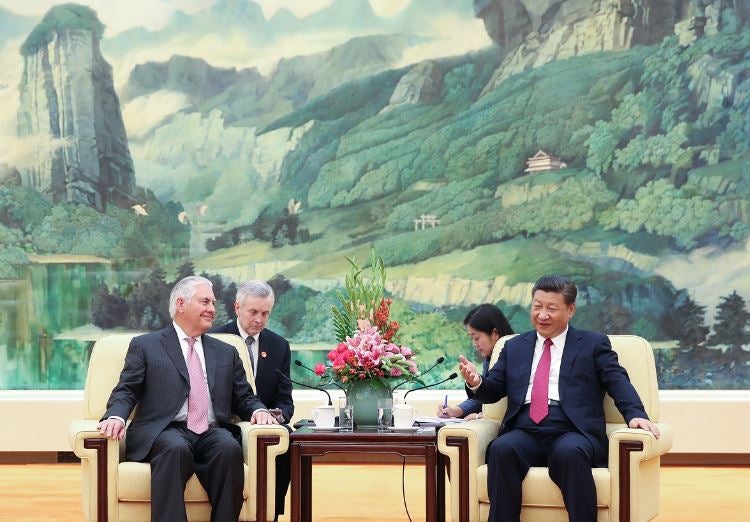North Korea crisis: US in 'direct contact' with Pyongyang, says Rex Tillerson
'We have lines of communications to Pyongyang — we’re not in a dark situation, a blackout.' says Secretary of State

Your support helps us to tell the story
From reproductive rights to climate change to Big Tech, The Independent is on the ground when the story is developing. Whether it's investigating the financials of Elon Musk's pro-Trump PAC or producing our latest documentary, 'The A Word', which shines a light on the American women fighting for reproductive rights, we know how important it is to parse out the facts from the messaging.
At such a critical moment in US history, we need reporters on the ground. Your donation allows us to keep sending journalists to speak to both sides of the story.
The Independent is trusted by Americans across the entire political spectrum. And unlike many other quality news outlets, we choose not to lock Americans out of our reporting and analysis with paywalls. We believe quality journalism should be available to everyone, paid for by those who can afford it.
Your support makes all the difference.America's top diplomat has said his country is now in direct communication with North Korea amid an unprecdented deterioration in relations between Washington and Pyongyang.
US Secretary of State Rex Tillerson made the revelation during a visit to China, where he is discussing the crisis on the Korean peninsula with President Xi Jinping and other leaders.
“We have lines of communication to Pyongyang,” Mr Tillerson said. “We’re not in a dark situation.”
He said the Trump administration was “probing” the potential for talks with North Korea, adding: “So stay tuned.”
When asked about how he would approach Kim Jong-un, Mr Tillerson replied: “We ask, ‘Would you like to talk?’ We have lines of communications to Pyongyang — we’re not in a dark situation, a blackout. We have a couple, three channels open to Pyongyang.”
The US Secretary of State declined to comment if the North Koreans had replied to requests to dialogue.
“We can talk to them,” he said, speaking at the residence of Terry Branstad, the US ambassador to Beijing. “We do talk to them."
He denied those lines of communication went via China, saying: “We have our own channels.”
Speaking an hour after meeting the Chinese President, Mr Tillerson said he was keen to tone down the bellicose rhetoric between Mr Trump and his North Korean counterpart.
Meanwhile, Mr Trump was called a “racist Orangutan” by North Korea's news service in response to the American leader's comments about the “poor leadership” of Yulin Cruz, the mayor of Puerto Rico's capital, San Juan.
“The whole situation is a bit overheated right now,” Mr Tillerson said in a New York Times report. “If North Korea would stop firing its missiles, that would calm things down a lot.”
The two countries have been in low-key discussions for months, according to the Associated Press, with “diplomatic contact… occurring regularly” between the US envoy for North Korea policy and a “senior North Korean diplomat at the country’s UN mission”.
Narushige Michishita, director of the Security and International Studies Program at the National Graduate Institute for Policy Studies in Tokyo, said it was not unexpected that the two countries were in communication with one another, despite the increasingly hostile war of words.
“It was perfectly clear that both North Korea and the United States, and others, are in the renegotiation bargaining process,” he said.
Sweden could also play a key role as peacemaker if discussions falter between the US and North Korea. “Sweden has done so on numerous occasions before, especially in relation to imprisoned Americans,” Ulv Hanssen from the Swedish Institute of International Affairs told Reuters.
Join our commenting forum
Join thought-provoking conversations, follow other Independent readers and see their replies
Comments